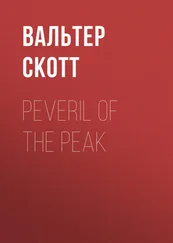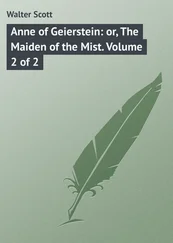Walter Scott - Peveril of the Peak
Здесь есть возможность читать онлайн «Walter Scott - Peveril of the Peak» весь текст электронной книги совершенно бесплатно (целиком полную версию без сокращений). В некоторых случаях можно слушать аудио, скачать через торрент в формате fb2 и присутствует краткое содержание. Жанр: Исторические приключения, на английском языке. Описание произведения, (предисловие) а так же отзывы посетителей доступны на портале библиотеки ЛибКат.
- Название:Peveril of the Peak
- Автор:
- Жанр:
- Год:неизвестен
- ISBN:нет данных
- Рейтинг книги:4 / 5. Голосов: 1
-
Избранное:Добавить в избранное
- Отзывы:
-
Ваша оценка:
- 80
- 1
- 2
- 3
- 4
- 5
Peveril of the Peak: краткое содержание, описание и аннотация
Предлагаем к чтению аннотацию, описание, краткое содержание или предисловие (зависит от того, что написал сам автор книги «Peveril of the Peak»). Если вы не нашли необходимую информацию о книге — напишите в комментариях, мы постараемся отыскать её.
Peveril of the Peak — читать онлайн бесплатно полную книгу (весь текст) целиком
Ниже представлен текст книги, разбитый по страницам. Система сохранения места последней прочитанной страницы, позволяет с удобством читать онлайн бесплатно книгу «Peveril of the Peak», без необходимости каждый раз заново искать на чём Вы остановились. Поставьте закладку, и сможете в любой момент перейти на страницу, на которой закончили чтение.
Интервал:
Закладка:
Dame Whitecraft did not decline this familiarity; for there is no room for traversing upon a horse-block, and the hands which might have served her for resistance, were occupied with glass and bottle—matters too precious to be thrown away in such a struggle. Apparently, however, she had something else in her head; for as, after a brief affectation of reluctance, she permitted Peveril's face to approach hers, she whispered in his ear, "Beware of trepans!"—an awful intimation, which, in those days of distrust, suspicion, and treachery, was as effectual in interdicting free and social intercourse, as the advertisement of "man-traps and spring-guns," to protect an orchard. Pressing her hand, in intimation that he comprehended her hint, she shook his warmly in return, and bade God speed him. There was a cloud on John Whitecraft's brow; nor did his final farewell sound half so cordial as that which had been spoken within doors. But then Peveril reflected, that the same guest is not always equally acceptable to landlord and landlady; and unconscious of having done anything to excite the miller's displeasure, he pursued his journey without thinking farther of the matter.
Julian was a little surprised, and not altogether pleased, to find that his new acquaintance held the same road with him. He had many reasons for wishing to travel alone; and the hostess's caution still rung in his ears. If this man, possessed of so much shrewdness as his countenance and conversation intimated, versatile, as he had occasion to remark, and disguised beneath his condition, should prove, as was likely, to be a concealed Jesuit or seminary-priest, travelling upon their great task of the conversion of England, and rooting out of the Northern heresy,—a more dangerous companion, for a person in his own circumstances, could hardly be imagined; since keeping society with him might seem to authorise whatever reports had been spread concerning the attachment of his family to the Catholic cause. At the same time, it was very difficult, without actual rudeness, to shake off the company of one who seemed so determined, whether spoken to or not, to remain alongside of him.
Peveril tried the experiment of riding slow; but his companion, determined not to drop him, slackened his pace, so as to keep close by him. Julian then spurred his horse to a full trot; and was soon satisfied, that the stranger, notwithstanding the meanness of his appearance, was so much better mounted than himself, as to render vain any thought of outriding him. He pulled up his horse to a more reasonable pace, therefore, in a sort of despair. Upon his doing so, his companion, who had been hitherto silent, observed, that Peveril was not so well qualified to try speed upon the road, as he would have been had he abode by his first bargain of horse-flesh that morning.
Peveril assented dryly, but observed, that the animal would serve his immediate purpose, though he feared it would render him indifferent company for a person better mounted.
"By no means," answered his civil companion; "I am one of those who have travelled so much, as to be accustomed to make my journey at any rate of motion which may be most agreeable to my company."
Peveril made no reply to this polite intimation, being too sincere to tender the thanks which, in courtesy, were the proper answer.—A second pause ensued, which was broken by Julian asking the stranger whether their roads were likely to lie long together in the same direction.
"I cannot tell," said the stranger, smiling, "unless I knew which way you were travelling."
"I am uncertain how far I shall go to-night," said Julian, willingly misunderstanding the purport of the reply.
"And so am I," replied the stranger; "but though my horse goes better than yours, I think it will be wise to spare him; and in case our road continues to lie the same way, we are likely to sup, as we have dined together."
Julian made no answer whatever to this round intimation, but continued to ride on, turning, in his own mind, whether it would not be wisest to come to a distinct understanding with his pertinacious attendant, and to explain, in so many words, that it was his pleasure to travel alone. But, besides that the sort of acquaintance which they had formed during dinner, rendered him unwilling to be directly uncivil towards a person of gentleman-like manners, he had also to consider that he might very possibly be mistaken in this man's character and purpose; in which case, the cynically refusing the society of a sound Protestant, would afford as pregnant matter of suspicion, as travelling in company with a disguised Jesuit.
After brief reflection, therefore, he resolved to endure the encumbrance of the stranger's society, until a fair opportunity should occur to rid himself of it; and, in the meantime, to act with as much caution as he possibly could, in any communication that might take place between them; for Dame Whitecraft's parting caution still rang anxiously in his ears, and the consequences of his own arrest upon suspicion, must deprive him of every opportunity of serving his father, or the countess, or Major Bridgenorth, upon whose interest, also, he had promised himself to keep an eye.
While he revolved these things in his mind, they had journeyed several miles without speaking; and now entered upon a more waste country, and worse roads, than they had hitherto found, being, in fact, approaching the more hilly district of Derbyshire. In travelling on a very stony and uneven lane, Julian's horse repeatedly stumbled; and, had he not been supported by the rider's judicious use of the bridle, must at length certainly have fallen under him.
"These are times which crave wary riding, sir," said his companion; "and by your seat in the saddle, and your hand on the rein, you seem to understand it to be so."
"I have been long a horseman, sir," answered Peveril.
"And long a traveller, too, sir, I should suppose; since by the great caution you observe, you seem to think the human tongue requires a curb, as well as the horse's jaws."
"Wiser men than I have been of opinion," answered Peveril, "that it were a part of prudence to be silent, when men have little or nothing to say."
"I cannot approve of their opinion," answered the stranger. "All knowledge is gained by communication, either with the dead, through books, or, more pleasingly, through the conversation of the living. The deaf and dumb , alone, are excluded from improvement; and surely their situation is not so enviable that we should imitate them."
At this illustration, which awakened a startling echo in Peveril's bosom, the young man looked hard at his companion; but in the composed countenance, and calm blue eye, he read no consciousness of a farther meaning than the words immediately and directly implied. He paused a moment, and then answered, "You seem to be a person, sir, of shrewd apprehension; and I should have thought it might have occurred to you, that in the present suspicious times, men may, without censure, avoid communication with strangers. You know not me; and to me you are totally unknown. There is not room for much discourse between us, without trespassing on the general topics of the day, which carry in them seeds of quarrel between friends, much more betwixt strangers. At any other time, the society of an intelligent companion would have been most acceptable upon my solitary ride; but at present——"
"At present!" said the other, interrupting him. "You are like the old Romans, who held that hostis meant both a stranger and an enemy. I will therefore be no longer a stranger. My name is Ganlesse—by profession I am a Roman Catholic priest—I am travelling here in dread of my life—and I am very glad to have you for a companion."
"I thank you for the information with all my heart," said Peveril; "and to avail myself of it to the uttermost, I must beg you to ride forward, or lag behind, or take a side-path, at your own pleasure; for as I am no Catholic, and travel upon business of high concernment, I am exposed both to risk and delay, and even to danger, by keeping such suspicious company. And so, Master Ganlesse, keep your own pace, and I will keep the contrary; for I beg leave to forbear your company."
Читать дальшеИнтервал:
Закладка:
Похожие книги на «Peveril of the Peak»
Представляем Вашему вниманию похожие книги на «Peveril of the Peak» списком для выбора. Мы отобрали схожую по названию и смыслу литературу в надежде предоставить читателям больше вариантов отыскать новые, интересные, ещё непрочитанные произведения.
Обсуждение, отзывы о книге «Peveril of the Peak» и просто собственные мнения читателей. Оставьте ваши комментарии, напишите, что Вы думаете о произведении, его смысле или главных героях. Укажите что конкретно понравилось, а что нет, и почему Вы так считаете.








